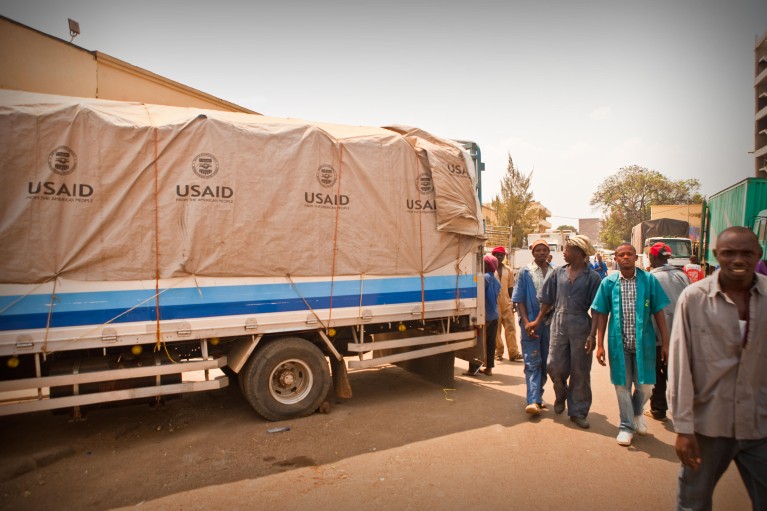
A USAid truck delivers goods to the citizens of Kigali, Rwanda.Credit: Corey Weiner / Alamy Stock Photo
In South Africa it took just days for the impacts of the slew of executive orders US president, Donald Trump, to be felt, with reports of HIV clinics closing, scheduled training programmes cancelled, and trans health centres forced to shut their doors.
For Africa, the fallout comes from multiple sides. The stop-work order for foreign assistance, for instance, impacts the work of the US Agency for International Development (USAID), which reports that the US provided nearly $6.6 billion in humanitarian assistance across sub-Saharan Africa in 2024 alone. That includes some $450 million in support of countless South African health initiatives.
Within a week of Trump’s return, the Wits Reproductive Health and HIV Institute (RHI) Trans Health Centre closed its Key Populations Programme clinics, citing the USAID stop-order. Likewise, the country's Medical Research Council had to cancel a grant-writing workshop funded through the US National Institutes of Health (NIH) days after Trump froze the agency’s activities and funding. Recipients of funding through the US President’s Emergency Plan for AIDS Relief (PEPFAR) received notification to stop all activities, including the provision of antiretroviral medicine (ARVs) for HIV. PEPFAR funds HIV treatment and intervention campaigns in Botswana, Mozambique, Namibia, Uganda, and Zimbabwe, among others.
A few days after the stop-orders were issued, US Secretary of State Marco Rubio announced exemptions to “life-saving humanitarian assistance,” leading to confusion among aid recipients.
In Africa, the freeze could lead to the disruption of emergency responses to outbreaks, such as mpox and the Marburg virus. Training programmes, accelerated since the COVID-19 pandemic, could slow down. HIV/AIDS testing, treatment and prevention programmes may be hit, along with immunisation initiatives.
If the PEPFAR and USAID fallout was almost immediate, there are questions around the impact on Africa of Trump’s other executive orders, such as the withdrawal from the World Health Organization (WHO), which only comes into effect a year after the announcement to withdraw. Experts contacted by Nature Africa expect that the loss of US funding is expected to cascade across WHO’s activities around the world.
A founding member, the US contributes more than 15% of WHO’s annual funding. In its response to the announcement, WHO said that it looked forward to “engaging in constructive dialogue to maintain the partnership”.
For some experts, this is a wake-up call. According to Angela Apeagyei, assistant professor at the Institute for Health Metrics and Evaluation (IHME) at the University of Washington (US) and author of a 2024 study1 on health spending in sub-Saharan Africa, African countries will ultimately have to become less dependent on external donors and "prioritise domestic funding to the health sector and efficient public finance management".
